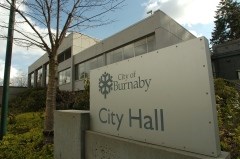While city hall grapples with setting a budget and tax rate for 2016, there’s at least one thing homeowners won’t have to deal with.
The city’s financial management committee has decided against property tax averaging, an idea that was considered in light of the sky-high property assessments facing thousands of homeowners in Burnaby this year.
The city has the power, when experiencing dramatic increases in assessed values to pass a bylaw to average the assessed values over three years.
While it’s been done in Vancouver, it doesn’t appear Burnaby will follow suit, with a staff report noting averaging assessments redistributes the tax burden from higher valued properties to lower valued properties in a given year.
The staff report assessed Vancouver’s use of the measure, finding averaging brings all properties closer to the average change in assessment value and reduces the immediate impact of increases in assessment values on property taxes by smoothing out significant changes in a given year.
However, because the purpose of property taxes is to provide needed revenue for city services, when reducing the taxes for properties with a higher than average increase, other lower valued properties pay higher amounts to make up the shortfall in total taxes collected.
The report still has to go through city council.
Coun. Paul McDonell, who sits on the finance committee, suggested the move would penalize property owners with the lowest taxes and subsidize people with higher property values.
“To me that doesn’t make any sense. If you’ve got a place worth $2 million, why should a person that’s got a condominium… be paying higher taxes just to lower your taxes,” he told the NOW.
City council had been asking the provincial government for help to deal with assessments as it relates to property taxes, mainly asking for a freeze on assessments.
That request was declined, by the Minister for Community, Sport and Cultural Development earlier this year.
In December, 7,000 Burnaby homeowners were given pre-assessment letters notifying them they could expect a dramatic increase in their property assessments.
The average increase for a typical single-family home in Burnaby ended up between 15 to 25 per cent. In some cases, homeowners have seen their property values rise by more than 30 per cent.
McDonell said the city wants to work with the province to change the homeowners grant threshold, noting a recent lift in the threshold to $1.2 million doesn’t return it to the level where it was cut to three years ago. He argued the grant threshold should keep pace with inflation.
The staff report also pointed out 78 per cent of Burnaby residential homes meet the lower eligibility threshold, based on an average residential property value of $819,519, but it’s 13 per cent less than the provincial target.
The city’s 2016 provisional budget is proposing a 2.95 per cent residential property tax increase, but McDonell said he’s confident the city can shave a little bit off that figure.



